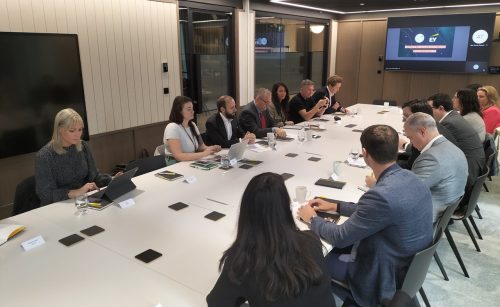Regional Growth: Is Yorkshire shouting loud enough?

How is Yorkshire doing economically? It clearly has so much going for it and is strong in a number of key sectors.
It has also made giant strides in so many ways but there is clearly work to be done, not least in infrastructure, skills and productivity.

Sixteen successful business people, across a range of key sectors, came together at the EY offices in Leeds to work out just how Yorkshire’s economy can be improved. How does it get itself noticed internationally and, with devolution on the increase, will the three metro Mayors – it will soon become four – make a difference to the county’s growth prospects?
Michael Clifford is part of EY’s team of economists and he set the scene, outlining the good news with three positive indicators… “drivers of inflation being reversed”, “positive change in global investor sentiment for the UK” and we’ve had “two quarters above 0.5% growth”.
EY has also recently conducted a UK attractiveness survey, evaluating inward investment trends and also surveying a number of business respondents.
He added: “There were three sectors that were seen as stand-out drivers at the heart of UK growth looking forward – digital technology, business and professional services, and financial services.
“Supporting that, when asked for their top three criteria when evaluating an investment decision in regional locations. respondents indicated that, firstly, the availability of regional grants and incentives would be really critical. I think that reflects the high cost of finance at the moment.
“Secondly, the availability of skills and the quality of their local workforce, and third, the availability of business partners and suppliers within the region and locality.
“Both sets of those measures really indicate how well positioned Leeds and its wider economy is with its service-based industry and place-based strengths – as we can see with the amazing regeneration around us. There is a real opportunity for regions to capitalise on that investor sentiment.”
Andrew McPhillips, chief economist at the Northern Powerhouse Partership, was generally positive about the outlook across the medium and long term although there might be some logistical issues around growing quickly enough.
He said: “One of the constraints on potential growth in the region is actual physical locations for people. I was told there’s going to be no grade A office space available for the next two years in the centre of Leeds, which is a constraint on potential growth, particularly in this city.
“Transport that’s also clearly key.”
Lloyds Bank has thousands of commercial clients and it surveys 1,200 every month. Its regional director Natalie Boswell explained why a pessimist-leaning north may skew findings slightly although she was generally positive about the region’s outlook.

Natalie Boswell of Lloyds Bank
“In July and August this year, we’ve seen business confidence nationally, the highest that we’ve seen it since 2015 although I don’t know if I particularly felt that being here and Yorkshire, alongside the North West, is always the lowest. So our confidence is always the lowest.”
The panellists
* Michael Clifford (EY assistant director)
* Stephen Church (EY UK&I North Markets Leader & Manchester Office Managing Partner)
* Alexandra Fogal (Head of EY Private North; EY Entrepreneur Of The Year UK partner co-lead)
* Natalie Boswell (Regional Development Director, Lloyds Bank)
* Médéric Payne (Chief Executive Officer, AIREA)
* Rachel Alexander (Head of People & Governance, Sure Group)
* Sharon Jandu (Director, NPH Ethnic Minority Business & Policy Forum)
* Mike Wilkinson (Senior Director – Major Pursuits, Schneider Electric)
* Andrew McPhillips (Chief Economist, Northern Powerhouse Partnership)
* Dan Spencer (Chief Executive, Torsion Group)
* Michael Hodgson (Chair, GLIDE (Gripple EOT))
* Ben Balfour (Managing Director, Advanced Supply Chain Group)
* Angie Cusworth (Co-Founder/Chief Operations Officer, Hardy Fisher)
* Olga Watterich (Deputy Regional Director, CBI)
* Jo Sykes (Divisional Director, Markel)
* James Wheelwright (Chief Executive, J&C Joel)
 Alex Fogal, EY’s head of Private North (pictured), saw things slightly differently.
Alex Fogal, EY’s head of Private North (pictured), saw things slightly differently.
“There was definitely a clear difference between the four key regions. We’ve surveyed Scotland, North Midlands, the South region and then London. And I would say, actually, across those four regions, the north, came out as being really optimistic. And I think that’s down to the communities that we operate across the north. We are definitely a community that is a lot closer and we will help others in the region. There’s a lot of kind of cross-business done, which has been really nice to see.”
Sharon Jandu, a Director at the NPH Ethnic Minority Business & Policy forum, felt that the remoteness of government was hugely unhelpful when it came to influencing the direction of their thinking.

Sharon Jandu
“I think we should be riding on the success of what we’ve got here. We’ve got some really, really great companies in the north. But I think if we wait too long, we’re going to miss the boat. And finally, when I was in Singapore, the access to government, literally… they’re on the streets. You went to the Labour Party Conference… it’s 30 grand to have a conversation with the business secretary.”
Jo Sykes, divisional Director of insurance specialists Markel, thought Leeds was not the best in promoting itself. Markel has recently invested heavily in the city.
“I’ve got offices in Manchester, we’ve got them in London, we’ve got them all over, and it does feel like Leeds needs to shout a bit more about how brilliant it is. So for us, after opening a flagship office, we’ve had so much PR off the back of that, and for us, it’s really important to work with the community. So we’ve had the Brownlee brothers in for our opening… proper local celebrities and we’re now supporting their foundation.
“People don’t see insurance as an attractive industry so for us, it’s really important that we get out in the community, people understand what we do and we can become part of that. Leeds is absolutely a flagship, and we’re copying that as a global blueprint for us from an office perspective.”
Andrew McPhillips explained why the region has to think broadly rather than focussing on what might be consider key industries.
“I think we have to not get too caught up on trying to figure out what the key sectors are going to be. And I’m guilty of doing this sometimes, but it’s more about putting conditions in place for business to flourish. So whether it’s skills, let’s not try and get too specific on what those skills are, because that’s going to change over the next 10 years in terms of what we need.
“Transport is going to play a key part in that. And I think if we’re going to have a dynamic northern economy, it’s key to make sure that people can move around easily, whether that’s doing business or traveling and commuting for work. So what they actually need to do, re the Mayors, is talk to each other and work collaboratively, and that includes across the Pennines.
“And from what I can tell, and what I’m told by the Mayors, is that in the first however many days we are now into a Labour government, they’ve already spent more time in Downing Street than they did in the entirety of the previous administration. So that suggests there’s at least a willingness to think and talk a bit more about what’s going on outside of London.”
Ben Balfour runs logistics heavyweight Advanced Supply Chain Group so is perfectly placed to see how this key part of any regional economy – keeping Yorkshire moving – is effecting its chance of blossoming.
He said: “We don’t really have the infrastructure for large scale supply chain logistics in the UK to deliver what we need to do. The electrification is not there. It’ll come last as well, predominantly for supply chains. But that doesn’t mean we can’t still make headwinds into it.
“The challenges we’re faced with, though, is the cost. It becomes cost prohibitive, and as a supply chain supplier, we don’t want to be the leader to do that big investment, to make that bold step. And I think until legislation is really in place within the country, there’s going to be this chicken and egg race with anybody in industry about who’s going to make that investment first. You can see in some businesses, some retailers, have made that step, but then it’s the consumer that’s paying for that. It’s not the retailer that’s paying for it, and it makes it very hard to be competitive in the supply chain world when you’re up against that type of legislation.”
When asked about the big positives, Olga Watterich (pictured) of the CBI pinpointed the green sector as one that has been outperforming the rest.
“We know GDP growth generally is not particularly exciting, but with the green tech sector, it has actually grown by about 9% over the last year. More generally those sectors where they’re solving a problem that we’ve got coming down the track is where the real exciting opportunities lie.
“More broadly, the anchor institutions and some of those universities that we’ve got across the north – which are absolutely amazing – is a huge thing to be excited about as well.
Andrew McPhillips was hopeful East Yorkshire would get massive shot in the arm when it gets its Mayor.
“Devolution to East Yorkshire and around the Humber, I think offers quite a lot of potential. We touched on the green sector and there is huge potential out on the Humber, which is already doing really well in that sector. And I’m quite excited to see what may come next as part of a devolution deal.
“I think Ben Houchen up in Tees Valley has shown what you can do if you have a have a vision and access to ports and the sea and off-shore wind and those kind of things.
Alex Fogal added: “I almost see three ecosystems within Yorkshire, in Sheffield, Hull and then Leeds. And I would say that they’re all very different business communities. But I think we probably need to do more to collaborate together. The point around the table we’ve heard loud and clear today is we need to shout louder. So whether that’s Leeds shouts louder, Yorkshire shouts louder, but we can only do that together. I think sometimes there’s a barrier between us but if we collaborate across all of the business ecosystems, then there’s no reason why everybody can’t succeed from that. And by doing that, our voice and brand will lift naturally.”
Médéric Payne, who runs carpet tile-making operation AIREA, has spent a lot of his business career abroad and felt Europe and the UK were being left behind by many other parts of the world although the ‘buying British’ tag still helped in certain countries.
“I’ve got all these people wanting to place orders, because what they want to buy is made in Yorkshire; British excellence, British quality. The only thing is right now, the pound is rather strong at the moment, which is causing a little bit of a pain in terms of being very competitive.
“What I’m begging for is free trade deals with India. Because at the moment, I could quadruple, if not triple, whatever the size of my orders with India. But I’m competing with companies, in countries like Japan, who have no import duty.”
Michael Hodgson is chair of GLIDE (Gripple EOT), a Sheffield-based manufacturer of building supplies and 85% of their income comes from exports and he didn’t see that reliance on international trade changing any time soon.
“I think, certainly from a business perspective, what we try and do as a principle is grow by 10% every year, which for us feels like sustainable growth as opposed to aggressive growth. And we try and do that organically. So for us it’s all about innovating in new products and diverse findings in new markets. So a lot of what we do is basically thinking about where else can we go and what else can we give our customers that they don’t have today?”
James Wheelwright’s company (J&C Joel) supplies theatres equipment to new venues all over the world and explained how critical the rapid economic expansion of the Middle East has been while the drop in inflation had also been incredibly helpful.
“Inflation, we’ve seen that sort of calm down a lot. We do see the UK starting to grow for us. Infrastructure projects is what we predominantly do, and a lot of those are starting to come back online. We’ve had a big lag, because obviously, during the Covid period, no one was committing to building new venues, new infrastructure projects. We’re seeing those start to come back.”
EY’s Stephen Church is a EY’s North Markets leader and he was pleased much of the conversation had centred on businesses exporting.
“It’s probably the first time in about three years where export has been so dominant in the conversation, because it’s all been about the local economy, rather than the how can we create a better local economy through export and other avenues, which is fabulous.”
He also stressed the importance of digital as well as physical connectivity.
“But to look at transport we are having increased devolution, which should create for more focus and attention onto local transport and broader connectivities, because you’ve got transport connecting towns and cities and cities to cities, but you’ve also got digital infrastructure. So let’s not forget about the digital infrastructure, because our digital infrastructure is crumbling. Right? Who takes a train and can get a mobile phone connection? How can you go to a remote part of the country and not get reliable Wi-Fi?
“So the physical infrastructure around our transport systems, I think, is well publicised about the state of it, but I think our digital infrastructure is falling behind when you look at some of our competitors in a global scale. So there’s questions around, how do we achieve economic growth when we’ve got better connectivity, whether digital connectivity, transport connectivity, it’s been proven that if we connect towns to cities and cities to cities, we will get a natural lift.
“So therefore, the physical for a second, the physical transport infrastructure is an absolute need where we have it reasonably okay in this country, we can point to parts where there has been prosperity. You know, whether you look at the London system, or whether you look at the emerging Manchester system, when you look at the plans for the city that we’re in in Leeds, it does demonstrate that if the investment comes, then there is an opportunity for that growth to happen.”
Angie Cusworth of Leeds-based data centre providers Hardy Fisher was perfectly placed to outline digital infrastructure issues affecting the region.
“You’ve got pockets of people that are shouting about digital and how we can improve things. But I don’t really feel that there is, apart from one person that springs to mind who everybody probably knows – Stuart Clark – and he’s really the voice of Leeds.
“I think there should be other people around the city that help and drive that innovation. So I think we need to definitely have better infrastructure. Obviously, with Microsoft recently buying a plot of land, it’s going to obviously help but we need more.”
Filling healthcare jobs has been a challenge nationally and regionally and Rachel Alexander of The Sure Group explained the lengths her company has gone to tackle that challenge.
“We’re definitely struggling in the healthcare sector to find people that have those skills, to the point where we’ve now created a training company within our healthcare business. Our feeling has been if we can’t necessarily bring people here, or find people here that have those skill sets, we’re going to do it internally. But it’d be interesting to see what could be done to have that greater pool of people that have the skills that we’re looking for.”








